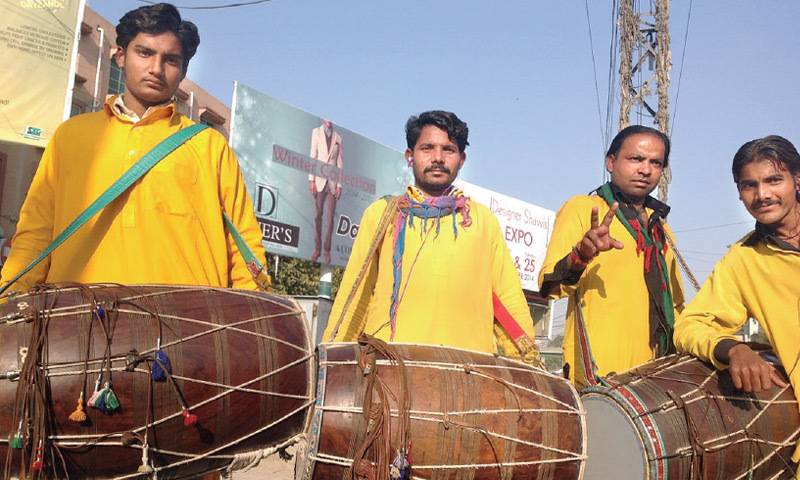
Following the two-month long lockdown, business activities in Pakistan have come to a halt, depriving the marginalised communities including traditional artists and performers of their already limited income.
“I am worried because the coronavirus pandemic is making it impossible for me to feed my family three times a day. If it gets prolonged, as my financial position is getting worse with every passing day,” says Master Abdul Razzaq, a local dhol wala (drummer) who works in the streets of Rawalpindi.
Master Razzaq, 47, and his 14-year-old son, Riasat Razzaq, perform at events along with their other group members in Rawalpindi and Islamabad to manage a humble living for their eight members of the family, including five young children.
Since the lockdown started, they have moved to their native village in Moza, Hyderabad. According to the cultural artist, covering everyday expenses is worsened on an empty pocket. He has six young children and a wife to support financially and since the lockdown imposed in the country the family has no source of income.
Razzaq says that he had applied for financial support under Prime Minister Ehsas Program, but neither he received reply of his message nor was his name among the villagers who were provided with financial aid.
“We found out that almost 200 deserving people in the village had applied for financial aid under Ehsas program, and only seven persons could receive Rs 12,000,” he deplored.
There are hundreds of people on the margins in his village who had applied for financial assistance but the government only provided financial assistance to six to seven persons and the rest are still waiting.
The people of our surrounding villages have been treated the same way, Razzaq said. He said that the majority of his village residents are daily wage workers and all of them are struggling to make both ends meet. There are hundreds of local artists who are affected by the pandemic.
“I am worried because the coronavirus pandemic is making it impossible for me to feed my family three times a day. If it gets prolonged, as my financial position is getting worse with every passing day,” says Master Abdul Razzaq, a local dhol wala (drummer) who works in the streets of Rawalpindi.
Master Razzaq, 47, and his 14-year-old son, Riasat Razzaq, perform at events along with their other group members in Rawalpindi and Islamabad to manage a humble living for their eight members of the family, including five young children.
Since the lockdown started, they have moved to their native village in Moza, Hyderabad. According to the cultural artist, covering everyday expenses is worsened on an empty pocket. He has six young children and a wife to support financially and since the lockdown imposed in the country the family has no source of income.
Razzaq says that he had applied for financial support under Prime Minister Ehsas Program, but neither he received reply of his message nor was his name among the villagers who were provided with financial aid.
“We found out that almost 200 deserving people in the village had applied for financial aid under Ehsas program, and only seven persons could receive Rs 12,000,” he deplored.
There are hundreds of people on the margins in his village who had applied for financial assistance but the government only provided financial assistance to six to seven persons and the rest are still waiting.
The people of our surrounding villages have been treated the same way, Razzaq said. He said that the majority of his village residents are daily wage workers and all of them are struggling to make both ends meet. There are hundreds of local artists who are affected by the pandemic.
